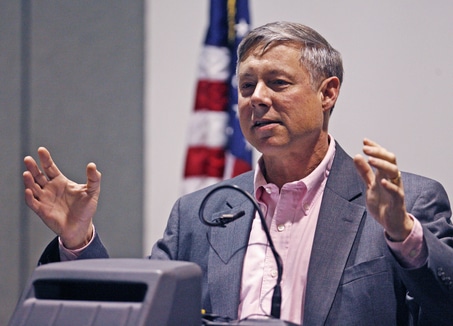So this is interesting.
Tomorrow, the House of Representatives Committee on Energy and Commerce–chaired by Fred Upton of Michigan, pictured here–will hold a hearing (though the Subcommittee on Energy and Power) on “Climate Science and EPA’s Greenhouse Gas Regulations.” It looks like it is going to be, basically, a science fight. Several scientists, like Christopher Field of Stanford and Richard Somerville of Scripps, are testifying who are sure to affirm the mainstream scientific consensus view of global warming. But there are also more “skeptical” scientists, like John Christy of the University of Alabama-Huntsville, on the docket.
Christy does acknowledge that humans are causing some degree of global warming, but questions whether it will be a “catastrophe.” Another scientist set to testify, Roger Pielke, Sr., also accepts that humans impact the climate but does not agree with the IPCC that most of the observed warming of the last 50 years is probably caused by greenhouse gas emissions.
In other words, we can expect both of these scientists to challenge how bad the problem is, not that there is a problem at all.
What’s odd about this is that the committee’s Republican leadership already seemed to have made up its mind that the science of climate was bunk—as James Inhofe told them last month–and that the EPA must be blocked in its scientific determination that greenhouse gases endanger public health and welfare and so should be regulated under the Clean Air Act.
In a hearing last month on this very topic. Rep. Bobby Rush of Illinois, a Democrat in the minority of the committee, commented, “Don’t you find it strange that this hearing is being conducted with no scientists at all?” And indeed, hearing from scientists is what committee Democrats very much seemed to want. In truth, they want even more scientific testimony than this.
My view is that it’s certainly better to hear from scientists than not to hear from them—but “science fight” hearings are rarely very enlightening. Some members of the media, the Congress, and the public are able to parse the flurry of claims and counterclaims. But most walk away with the impression that there’s a big “debate” and a lot of “uncertainty.”
So I guess my conclusion is, “two cheers” for the latest hearing. With so much climate skepticism and denial in the current Congress, it’s probably the best you are going to get.
Subscribe to our newsletter
Stay up to date with DeSmog news and alerts







